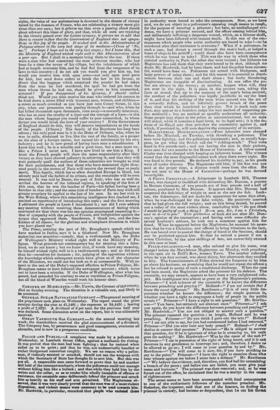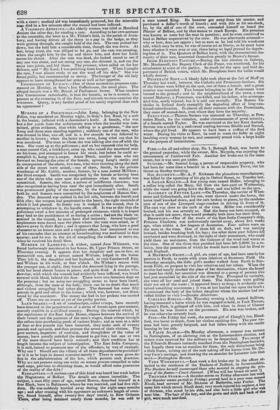in authority were bound to take the consequences. Now, as
we have said, we do not object to a policeman's opposing rough means to rough, for the purpose of securing a prisoner ; but here, on unchallenged evi- dence, we have a prisoner secured, and the officer coming behind him, and deliberately inflicting a desperate wound, which, on a thinner skull, might have been followed with instant death. Is this one of the con- sequences which people who resist authority are bound to take ?—to be murdered after their resistance is overcome ? What if a policeman, in such a case, had thrust a sword through the man's back, or lodged a brace of slugs in his midriff ; would these also have been consequences which he was bound to take ? This was the way in which those who resisted authority in Paris the other day were treated ; but hitherto ne Magistrate has told them that they were bound to be shot, although no doubt Mr. Hardwick, had he been there, and had the police been success- ful, would have done so. Policemen are armed with bludgeons, and large powers of using them ; and for this reason it is essential to discri- minate between their use and their abuse but booby blundering Magistrates are incapable of discriminating. At one office the po.. lice are always in the wrong ; at another, happen what will, they are ever in the right. It is plain in the present case, taking the facts as stated, that up to the moment of the man's being secured,. the conduct of the policeman was legally justifiable to say the least of it, and that his striking of the man when secured was the act of a cowardly fufrian, and au infinitely grosser breach of the peace than that which he interfered to prevent. Not to mark such com• duct, may appear to a brainless judge the best method of supporting po- lice authority ; but no method so speedily undermines all authority. Some people may object to the police as unconstitutional, but no man will object, while it remains a legal force, to its legal acts ; it is the de- fence of its illegal acts that provokes the community against it, and which, if persisted in, will soon deprive the community of its services. D MAGISTERIAL I SC RI 31 I NA T I 0 .N.—Four labourers were charged before Mr. Minshull, on Tuesday, with thrashing a policeman. The men were fighting, and the policeman interposed ; and, as usually hap- pens, he got what the Scotch call the " redding-straik." They were fined in five pounds each ; and not having the sum in their pockets, were sent for two months to the House of Correction. A fellow named Clarke was then charged with keeping an infamous house. The witness stated that the most disgraceful scenes took place there every night. He was fined in five pounds. He declared his inability to pay, as his goods were all under distress. The Magistrate told him, if the fine was not paid at the proper time, a distress would issue from the office. He was not sent to the House of Correction—perhaps he was deemed incorrigible. A Pious CHRISTIAN.—A fishmonger in Lambeth Hill, Thames Street, was charged at Guildhall with defrauding Mr. Duncan, a proctor in Doctors Commons, of two pounds out of four pounds and a half of salmon, purchased by Mrs. Duncan. It appears that Mrs. Duncan had suspected the deficiency of weight as soon as she saw the fish. Lock- ton, the fishmonger, did not make his appearance for some days after, when he was challenged for the false weight. He positively asserted. that he had given the full weight ; and on this being denied, he poured out a volley of the most violent abuse, concluding with "Do you think .1 would be gailty=of such a thing 3 D—n you, Sir, I am a Christian, and be d—d to you." This profession of faith did not alter Mr. Don- can's opinion of the transaction ; and having with some difficulty ob- tained Lockton's address, lie took out a summons against him for fraud.. When he appeared before the Magistrate, he repeated his asser- tion that he was a Christian, and offered to bring witnesses to the fact. He was bound over to answer the charge of fraud at the Sessions, should any be preferred against him. So that he retired a poorer if not a worse Christian, by the nine shillings of fees, not unworthily exacted in this case at least.
FIELD-PREACHING.—A man, who refused to give his name, was charged before the Marylehone Magistrates on Monday, with preaching in the open air in Brill's Row, Somers Town. The number collected, when he was first noticed, was about thirty, but afterwards they swelled to fifty. The Commissioners of Police directed the Inspector to let him go about his business, on promising that he would not repeat the offence; but he refused to accept of such a conditional discharge. When the case had been stated, the Magistrate asked the prisoner for his defence. The constable, we may remark, appears to have been a very enlightened sub. ject. His intelligence was almost as great as the Magistrate's patience. Prisoner—" I wish to know of the constable if he knows the difference between preaching and praying ?" Holland—" I am not certain that I know the exact difference." Mr. Rawlinson—" It is of very little im-
portance whether he knows the difference • the simple question is, whether you have a right to congregate a body of people in the public streets ?" Prisoner—" I have a right to ask questions." Mr. Rawlitn. son--" You have, but certainly not abstract ones." Prisoner—" I ask you again, do you know the difference between preaching and praying?" Mr. Hardwick—" You are not obliged to answer such a question." The prisoner repeated the question ; at length, Holland said he was
preaching. Prisoner—" Do you think I gave out the text ?" Holland —" I am not able to say, for you had commenced before I had returned." Prisoner—" Did you ever hear any body preach ?" Holland—" I shall decline to answer that question." Prisoner—" He is obliged to answer that question, for if he is ignorant of what he is swearing to, his oath goes for nothing." Mr. Hardwick—" Was he the cause of the mob V* Prisoner—" I am in possession of the right of being heard, and it is not decorous in any gentleman to interrupt me; and, therefore, I desire to be allowed to go on; I will come to your question by and by." Mr. Rawlinson—" You will come to it now, Sir, if you have anything to say to the point". Prisoner—" I have the right to examine those whop bear witness against me before I enter into a defence." Mr. Rawlinsou —" We believe the evidence, and, therefore, you find bail for committing a breach of the peace; and before you are bailed, you must give your name and business." The prisoner was then removed; and, as be Was forced out of the office, he exclaimed that he was a martyr in the =Se of righteousness. The arrest seems to have been accompanied with fatal consequeueeS to one of the enthusiastic followers of the nameless preacher. Mr. Godesbye, the inspector, said that one of the hearers, on finding the prisoner in custody, had become so despondent, that he cut his throat
with a razor; medical aid was immediately procured, but the miserable man died in a few minutes after the wound had been inflicted.
A VIGOROUS APPETITE.—An elderly woman was tried at Hereford Assizes the other day, for stealing a ram. According to her own account
the constable, she went to a Mr. Tibbat's field, in theparish of Aven- bury, and having driven all the sheep to a gap in the hedge, as they - were getting through, she caught hold of the ram. Therein pushed her down, but she held him a considerable time, though she was down. At last, being tired, she was obliged to let go, and the ram was escaping, - when she caught him by the leg and threw him, and drew her knife across his throat. After the ram was dead, she looked round to see if any one was about, and not seeing any one, she skinned it, and cut the meat into joints, and hid them. The prisoner, when called on for her
. defence, said " My Lord, I was perishing from ;flinger. When I caught the ram, I was almost ready to eat the wool off his skin." She was
. found guilty, but recommended to mercy. The hunger of the old lady • appears to have strengthened her arms as well as her appetite.
. Comm ssto sr or LUNACY.—One of these anomalous processes com- menced on Monday, at Gray's Inn Coffeehouse, the usual place. The
- alleged lunatic was a Mr. Brand, of Parliament Street. What renders this Commission remarkable, is that the lunatic, as he is termed, was present at the swearing in of the Jury, and intends to cross-examine the • witnesses. Query, is any farther proof of his sanity required than such an appearance ?



























 Previous page
Previous page